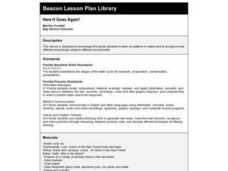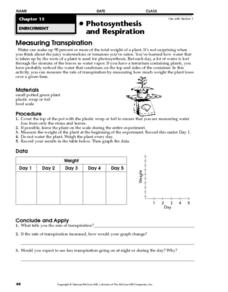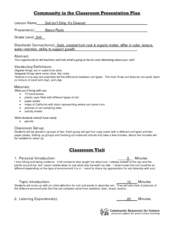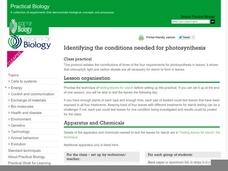Curated OER
Making a Terrarium
Students become familiar with the materials needed to build a terrarium. In this terrarium lesson, students create a terrarium in a bottle and observe how it grows and takes care of itself.
Curated OER
Native Planting for the Built or Green Environment
Students identify the terms used in naturescaping. They identify how to plant, how to do site preparation and how to develop a plan. Students explore the benefits of naturescaping for the health of the environment. They also...
Curated OER
The Living Environment
Students use a spoon, clothespin, scissors, and toothpicks to simulate how animals get food in their environment. In this environment lesson plan, students learn about the adaptations animals make in order to survive.
Curated OER
Here It Goes Again!
First graders work on patterns in nature and to recognize how different living things adapt to different environments such as the rain forest.
Curated OER
Measuring Transpiration
In this transpiration worksheet, students will conduct an experiment to measure the rate of transpiration from a plant by measuring how much weight the plant loses over 5 days. Students will record their data and create a graph of the...
Curated OER
Seeds! What is Inside; How does it Grow and Why is it Important?
Students discover the importance of seeds in relationship to nature. In this plant growth lesson plan, students create a collection of seeds and discover the best type of environment to plant them. Students plant their own...
Curated OER
People and the Environment
In this environment instructional activity, students look at how different human actions can cause pollution and how the pollution effects the environment. This instructional activity has 6 short answer questions.
Curated OER
Soil Isn't Dirty; It's Diverse!
Second graders participate in a soil activity. In this soil lesson plan students complete a worksheet describing different soil types and the organic and inorganic things found in them.
Curated OER
Water Quality and Temperature
Students are led through three activities to explore the effect of temperature fluctuations on the growth and survival of aquatic plants, clams, and shrimp eggs.
Curated OER
DOES A FLUCTUATION IN TEMPERATURE IFFECT THE GROWTH AND SURVIVAL RATE OF AQUATIC PLANTS?
High schoolers determine if different temperatures effect the growth and survival rates of aquatic plants and evaluate the optimal temperature for the growth of aquatic plants.
Inclement Weather and Its Effect on People
Using http://www.ready.gov/kids/know-the-facts students will read about four different types of emergencies and what to do before, during and after. After reading, students must decide how each could impact the lives of the people,...
University of Wisconsin
Rain Garden Species Selection
The activity really comes to life within its intended unit on starting a rain garden. Working in groups, participants research native plants and coordinate them with the conditions in the designated garden area. Give the class access to...
Curated OER
Evidence of Photosynthesis
Hands on science is the way to go! Learners conduct a lab experiment to help them explain how plants make food through photosynthesis. They test for the presence of starch in leaves using iodine solution and identify the basic things...
Curated OER
Does The Type of Mulch Used Affect Plant Growth?
Students measure, record and graph the plants they grow in a controlled setting. They feed and water the plants as needed and use the scientific method to evaluate the growth.
K12 Reader
Xylem and Phloem
The vascular tissue found in plants is the subject of a two-part comprehension worksheet that asks kids to read the provided article and then to respond to a series of comprehension questions.
New South Wales Department of Education
Plant Groups
Bryophytes can grow in temperatures just above zero degrees. This 17th installment in a series of 20 introduces learners to the five groups of plants: algae, bryophytes, pteridophytes, gymnosperms, and angiosperms. Classes then explore...
National Wildlife Federation
What's Your Habitat?
How are third graders like rabbits? They both live in habitats and require food, water, and shelter to survive! An educational science lesson encourages your learners to think about their own habitats and survival needs, before comparing...
Curated OER
Photosynthesis
Fifth graders work in small groups to brainstorm responses to a problem related to some disaster that wipes out half or all plant life on earth. Groups complete a graphic organizer to compare and contrast their ideas. Students select...
Curated OER
The Plant Food Factory
Plants need sun and water to survive. Let kids discover these facts by reading a block of informational text and considering a scientific quandary. They read the text, then use the information to complete a two-part question about plant...
Curated OER
It's Just Dirt
Students discover how seed germination varies according to the soil type. In this soil science lesson, students discuss what plants need in order to grow and investigate various types of soil. Students use their senses to describe each...
Curated OER
The Nitrogen Cycle
The nitrogen cycle is the focus of a well-designed science activity. In it, learners see that plants and animals produce waste products and decompose after death. Many of the waste products include nitrogen which is absobed by other...
Nuffield Foundation
Identifying the Conditions Needed for Photosynthesis
Budding biologists often ask how scientists know what they do about different topics. In the lab described here, they have a chance to find out first-hand about the requirements for photosynthesis. Three sequential investigations are...
ARKive
Adaptations to Arid Habitats
How do plants and animals survive in habitats with very little water? Explore arid ecosystems and the way their inhabitants have adapted with a activity and science experiment. After kids listen to a presentation about adaptation, they...
Virginia Department of Education
Weather Patterns and Seasonal Changes
Get your class outside to observe their surroundings with a lesson highlighting weather patterns and seasonal changes. First, learners take a weather walk to survey how the weather affects animals, people, plants, and trees during...
Other popular searches
- Compare Water and Land Plants
- Animals Plants and Water
- Plants Clean Water
- Waste Water Treatment Plants
- Dirty Water Plants
- Plants and Water Movement
- Nyc Water Treatment Plants
- Plants Need Water
- Plants Water Uptake
- Air Water Plants Animals
- How Plants Absorb Water
- Plants Water Osmosis























